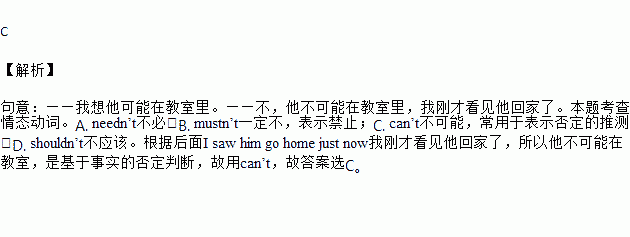题目内容
--- He may be in the classroom ,I think.
--- No, he ___________ be in the classroom ,I saw him go home just now.
A. needn’t B. mustn’t C. can’t D. shouldn’t
练习册系列答案
 小学期末标准试卷系列答案
小学期末标准试卷系列答案
相关题目
请根据下表中的信息用英文介绍你的好友Lily。要求条理清楚,语句通顺,可做适当发挥。词数100字左右,文章的开头已经给出,不计入总词数。
外貌 | 圆脸,笑眯眯的大眼睛;比我矮一点;带着小圆眼镜,让她看上去很机灵。 |
特点 | 1. 礼貌的女孩,诚实;我信任她,真正的朋友,因为……。当我忧伤时,她总是关心我,而且仔细倾听我的问题,……。 2.有幽默感,擅长讲滑稽的笑话;和她在一起,我很少感到……。 3. 喜欢DIY,…… 3.愿意和别人分享东西,帮助人时总有耐心,长大后……。 |
I would like to tell you something about my close friend Lily.

